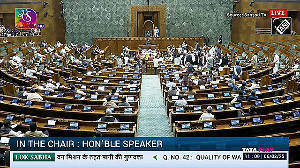State Bank of India Chairman Om Prakash Bhatt is known for playing by the book. Even last Friday he wanted to do the same by putting a temporary freeze on lending for purchase of farm equipment. The idea was to check a further pile up of bad debt on the Rs 7,000-crore (Rs 70-billion) portfolio that has 17 per cent sticky assets.
SBI's move may not have moved the farmers, who had stopped paying their monthly installments ever since Finance Minister P Chidambaram announced a Rs 60,000-debt waiver plan, but it did create a furore in political circles. Finally, Chidambaram, by his own admission, had to intervene and get SBI to roll back the move.
For the 57-year-old SBI chief, who has earned an unprecedented five-year term, it proved to be a rare instance of being 'misunderstood'. Bhatt, who, by his own assessment has made the 'elephant dance', has been proactive not just in shaping what he calls a "new SBI" but also in sensing government mood and acting accordingly.
For instance, he was among the first to put in place a new payment mechanism for public offers. While the initiative, which was recently approved by the Sebi board, is aimed at fine-tuning the bidding process, it also makes business sense for India's largest bank.
Last year, he managed to convince the Centre to part with Rs 10,000 crore (Rs 100 billion) for a rights issue, the biggest that India has seen, at a time when the markets were not doing too well. Bhatt's perseverance with the finance ministry also opened the doors for the other state-run banks to raise capital. Similarly, he managed to convince the government on the long-pending issue of merger of associate banks with SBI.
What probably helped him was his experience in dealing with the government. A 1972-batch executive, Bhatt joined the bank because his parents insisted.
He wanted to be an IAS officer, but in those days, SBI was a better paymaster. Having spent his initial years in various branches, Bhatt made it to the corporate office as executive assistant to PG Kakodkar, where he learnt to manage the dynamics and various pulls and pressures.
His colleagues, many of whom are his biggest critics, acknowledge that the stint helped him.
His rise has been meteoric. He was in Washington, then joined as General Manager in Lucknow, before moving to Guwahati as Chief General Manager. He then took over as the managing director of State Bank of Travancore.
Having pipped others to the post of the Managing Director of SBI, the man from Uttaranchal, became the SBI chairman in 2006.
After taking over the reins at SBI, Bhatt focused on regaining the market share -- both for deposits and advances - which the bank had lost to its more agile private sector rivals. He set an ambitious target to increase its market share by 25 basis points (0.25 percentage points) every quarter.
He is also credited for putting in place the nationwide change management programme, 'Parivartan', to bring back a sense of pride among employees.
He injected fresh blood into the system by recruiting technology-savvy young professionals to manage counters and cross-sell products. Bhatt is more than happy with the response and says that others companies are seeking his assistance to develop similar programmes.
Under his leadership, the bank started looking at new businesses ranging from general insurance, pensions to private equity. So far, his strategy has paid off but his success in the future will also depend on SBI's ability to raise capital and price products.
"What you are seeing is a new SBI," Bhatt told Business Standard in an interview last month. What he, perhaps, did not realise was that some things -- like the government's political compulsions -- never change.







 © 2025
© 2025